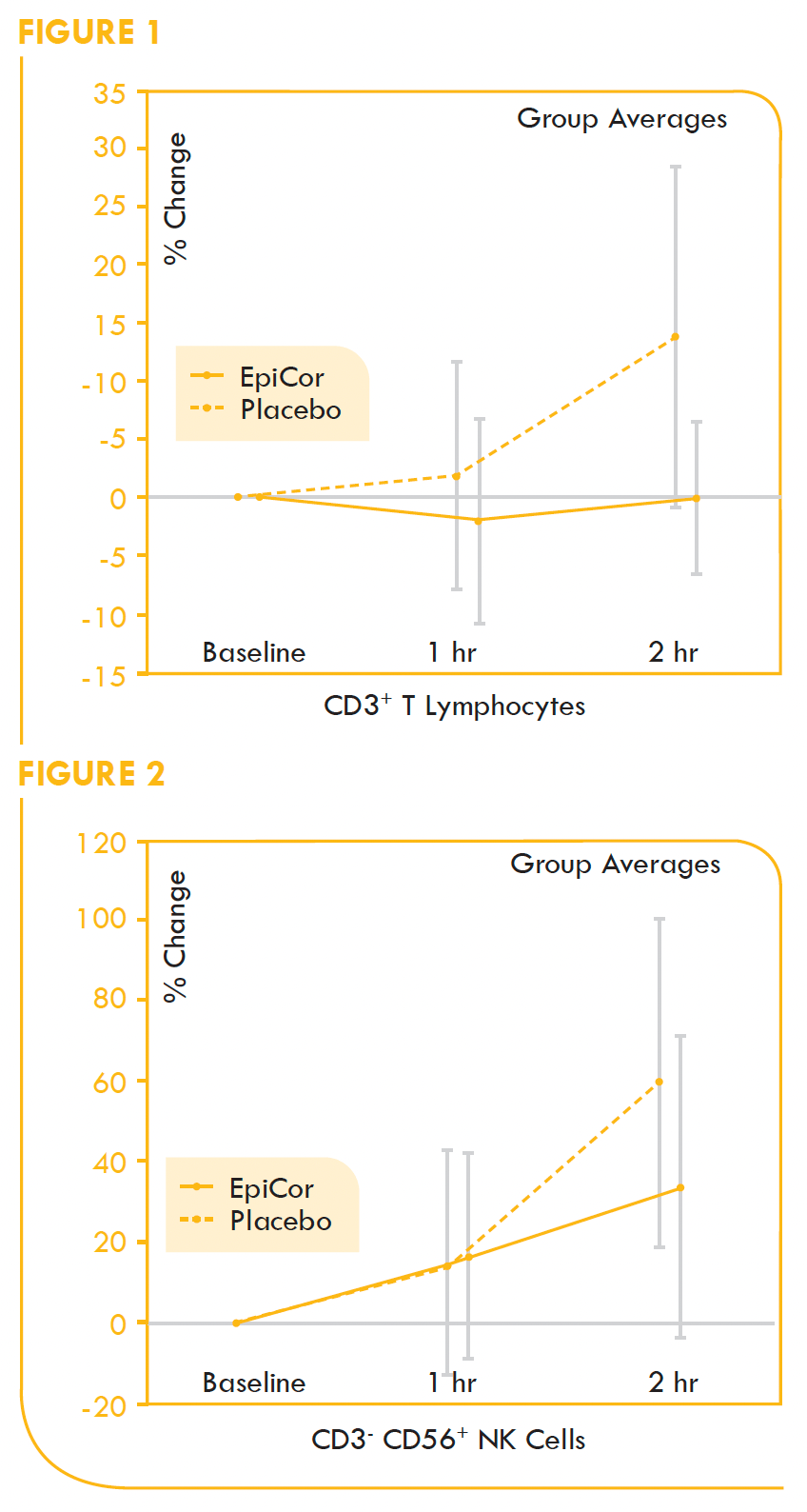rapid immune
Rapid Immune-Modulating Effects of EpiCor® on Adults (Published Pilot Study)
Sponsored by EpiCor Postbiotic, a Cargill brand
Photo courtesy of: Getty Images / Amriphoto
Introduction
This pilot clinical trial examined immune biomarkers within 2 hrs after a single capsule ingestion of 500 mg of EpiCor® postbiotic on adult subjects.
Key Findings Include:
• Antioxidant protection capacity, as measured by an in vitro serum CAP-e assay, significantly increased after 2 hrs with EpiCor® vs placebo (p<0.04).
• T and NK cells in the serum significantly suppressed with EpiCor® vs placebo (p<0.01 and p<0.05, respectively), which was an indication of acute immune modulation.
• Activation markers CD25 at 2 hrs and CD69 at 1 hr on CD3-CD56+ NK cells significantly increased with EpiCor® vs placebo (p<0.05 for both) but did not change for T cells.
• No statistically significant differences in cytokine levels (mild reduction of IL-6 and IL-10 at 2 hrs with EpiCor® vs placebo, transient increase of INF-ɣ at 1h), and no acute changes on white, red or granulocyte cell counts over time vs placebo.
methods
In this double-blind, randomized, placebo-controlled crossover pilot trial, 12 healthy adults (3 men and 9 women), were given a single dose of EpiCor® postbiotic (500 mg) or a white rice flour placebo control (with a 2 week washout period between testing). Blood was drawn before treatment, one hour, and two hours after ingestion.
Blood samples were collected for complete blood count with differential, antioxidant status, and cytokine profile.
Antioxidant status was tested using the CAP-e assay (cell-based antioxidant protection in erythrocytes). It measures how well the blood protects erythrocytes (red blood cells) from oxidative damage. Thus, data from this assay does not reflect the uptake of antioxidants in circulation after treatment ingestion, but rather measures those antioxidants that are able to enter and protect cells from oxidative damage.
Immune surveillance, a marker for immune activation, is the process of trafficking and homing of immune cells from circulation in the blood to tissues. Immune surveillance was assayed through analyzing the blood samples with a complete blood count (CBC). A decrease in white blood cells, specifically T cells and natural killer (NK) cells, indicates that these cells have become activated for surveillance and were homing into tissues to monitor for infections.
Another measure for immune cell activation is by monitoring protein biomarkers CD25 and CD69. Increased presence of these proteins on the surface of circulating NK cells indicates that these immune cells have been activated.
Results
At 2 hrs post acute EpiCor® ingestion a statistically significant increase in antioxidant protection capacity, as measured by CAP-e, was observed in the serum when compared to placebo ingestion at the same time point (p<0.04).
Also, within the two hour window of observation, indicators of acute immune-modulation were changed post-EpiCor® ingestion compared to placebo. There was a statistically significant suppression of T and NK cells in the serum (p<0.01 and p<0.05, respectively) with EpiCor® supplementation compared to placebo (Figure 1 and 2).
Furthermore, this human clinical study indicated that it was possible for NK cells to be activated in the observed time window, but it is unknown what impacts occur beyond this. Following ingestion of a 500 mg capsule of EpiCor®, the CD25 markers of serum NK cells were statistically different vs placebo after 2 hrs (p<0.05). CD69 significantly increased only at the 1 hour time point with consumption of EpiCor® compared to placebo (p<0.05).

Conclusion
This pilot study demonstrates emerging science that needs a larger study designed to incorporate both acute and chronic observations of immune markers, the underlying mechanism of action, and demonstrate the potential for EpiCor® postbiotic to sustain effects on immune health.
